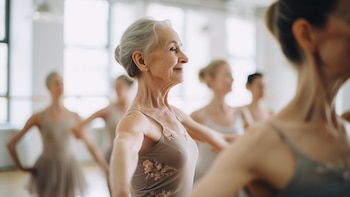






Have a hobby It is not only a way to pass the time; It can also significantly impact people’s health and well-being. From gardening to tennis, science has shown that hobbies can contribute to better physical and mental health, and these benefits can be especially felt in older people. The type of hobby does not matter, the important thing is to participate in an activity that motivates and generates well-being.
A series of recent studies have analyzed the relationship between having hobbies and mental well-being in people over 65 years of age. In these studies, carried out in countries such as United States, Japan, China and in 13 European countries, more than 93 thousand people participated over a period of four to eight years. The results showed that people with hobbies experienced fewer symptoms of depressionin addition to higher levels of health, happiness and life satisfaction compared to those who did not have it. The interesting thing is that the type of hobby was not as relevant as the simple fact of having it.
The researcher Hei Wan Maklead author of one of these studies, emphasizes that the benefits of hobbies are “universal in different countries and cultural environments.” In addition to providing entertainment, these activities are a factor that improves the quality of life of older people.

Practicing certain sports and leisure activities can have a direct impact on longevity. He Copenhagen City Heart Study analyzed the participation of thousands of people in different sports over a 25-year follow-up, showing that certain sports are associated with a longer life expectancy. While activities such as swimming, cycling and jogging added three to four years to life, sports involving social interactionlike the tennis and the badmintonhad an even greater impact: tennis players added almost a decade to their life expectancy. These results suggest that sports that encourage social contact and physical activity are especially beneficial for long-term health.
A study published by Nature Medicine confirms that the relationship between hobbies and mental well-being is consistent in different countries and cultures. This study, led by Daisy Fancourtnotes that regular engagement in recreational activities is associated with fewer depressive symptoms, greater happiness, and life satisfaction. Even though factors such as life expectancy and the national happiness levels vary from country to country, the positive impact of hobbies on mental health remains constant, reinforcing the need to promote equal access to leisure activities as part of public health strategies for healthy aging.

Physical activities such as run, swim and play tennis They have multiple benefits, from improving cardiovascular health and brain function to reducing the risk of chronic diseases such as diabetes. Sports like pickleballa more dynamic and social variant of tennis, also promote mental health, reducing loneliness and improving life satisfaction.

The gardening and the kitchen They are hobbies that allow you to better control your diet and eating habits. Gardening provides long-term mental health benefits, connecting people with nature and teaching them life skills. For its part, cooking helps reduce stress and stimulates areas of the brain related to memory and executive function.

Art and music not only offer an outlet for creative expression, but also provide therapeutic benefits. The practice of coloring, drawing or crafting can reduce stress, anxiety and depression, while playing or listening to music releases endorphins and dopamine, improving mood.
Being in contact with nature has positive effects on physical and mental health. Escaping the daily routine and spending time in green or blue spaces, such as forests and rivers, can improve cognitive performance, reduce the risks of mental illness, and strengthen the immune system.

Contact with nature during childhood has a protective effect against the development of mental disorders in adulthood. Recent studies indicate that greater early exposure to nature can improve subjective well-being and promote a stronger connection to the environment in adult life.
A study of the American Art Therapy Association shows that artistic practice can reduce levels of cortisolthe hormone linked to stress. Even a brief 45-minute session of creative activity is enough to reduce stress, demonstrating the power of artistic activities as a tool to improve emotional and mental health.